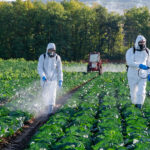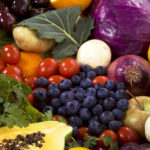By David Blyweiss, M.D., Advanced Natural Wellness
February 25, 2013
- Naturally healthy foods may not be so “natural” anymore
- Are you being sold a bill of goods?
- Fight back by choosing these healthier alternatives
Last week, one of my patients was telling me how “healthy” she was eating. Fresh fruits and vegetables and meats from her local supermarket. I was glad to hear it and told her so.
But something about that conversation stayed on my mind – and when I had a quiet moment, I thought about what eating healthy really means.
When we look at our food supply today, it looks quite different than it did years ago. Today’s “natural” food sources aren’t anything like they used to be. For the most part, I’m not sure they’re even natural anymore. So I started thinking – how do we define “natural”?
And why is all this “food altering” going on? Is it to make us healthier… or safer… maybe less prone to illness? What is the real intent?
Taking a closer look at these food manipulations I’m having trouble finding what benefit we get out of these practices.
Let’s look at radiation. It slows down spoilage of meat. And also delays the ripening of fruits and vegetables. So is the intent here simply a ploy to extend the shelf life of foods?
And what about genetically modified foods? Fruits and veggies are being manipulated to resist viruses, insects, herbicides and more. But they are also being modified to deliver a higher crop yield, enhance growth and delay ripening. That means more product to sell, less growing time and longer shelf life. And that adds up to more profits.
MD Exposes the Hidden Danger to Your Eyes

When your eyesight starts to fail, it's a real problem. Suddenly you can't go to the grocery store... you can't get to the doctor if you have an emergency... you can't meet your friends for dinner…
Your "regular" doctor doesn't have time to keep up with the latest research. And the same goes for eye doctors. They go to school to learn how to fit you for glasses and contacts, but have no way of preventing the damage and loss of eyesight that threatens your freedom and independence.
Let me show you something that explains a LOT about how your eyes work.
In my FREE Special Report, I'll show you a HUGE, untapped resource for your eyes that safely and naturally restores clear, effortless eyesight.
Click here to get started...
And then there’s the over-use of antibiotics in our livestock. Now, I’m not talking about giving a pig or cow an injection because they are sick. But the animals regularly get these drugs in their food or water. And that’s because antibiotics are a cheap way to make them grow faster. Plus it helps protect them from unsanitary living conditions.
I can’t help but wonder what benefit is there for you.
Are we all being sold a bill of goods? After all, it appears the food industry may be getting a lot more out of these practices than we are.
If you’re not sure exactly what these adulterations mean to you, let me explain…
Irradiation reduces things like bacteria, fungus and parasites in foods. These all contribute to disease and illness; and to food spoilage. It also helps delay the ripening of fruits and vegetables. It even helps prevent bulbs and tubers (onions, garlic, potatoes) from sprouting.
The problem with radiations is it zaps certain nutrients right out of some foods. These include vitamins A, C, D, E, K and many of the B vitamins. It also produces something called “radiolytic byproducts.” Some of these chemicals, like formaldehyde and benzene can increase your risk of cancer.
And guess what? The FDA recently approved an increase in the amount of irradiation that can occur. Prior to the change, only refrigerated or frozen meats could be irradiated. Now they’ve added unrefrigerated raw meat to the policy. They’ve also increased the dose of radiation allowed for poultry.
Antibiotic use in livestock is also a real problem today.
An article from the Union of Concerned Scientists says about 70% of all antibiotics in the U.S. are given to healthy farm animals. The reason: To promote faster growth and compensate for unsanitary living conditions.
Did you catch that? They are feeding antibiotics to pigs, cattle and chicken to make them grow faster. And in unsanitary conditions to boot.
But there’s also another issue here and it’s an even bigger one.
You see, over use of antibiotics causes an increase in antibiotic-resistant bacteria. Simply put, it causes them to lose their effectiveness against human disease.
Are You Suffering From...
- Love handles and a pot belly
- Romance that isn't what it used to
- Forgetfulness and inattention
- Low (or no) strength and endurance
- A sex drive that's shifted into neutral...or worse
If so...you may have Mature Male Burnout. Click here to discover more about this unique condition and what you can do about it.
According Peter Lehner, the executive director of the Natural Resources Defense Council (NRDC,) “Accumulating evidence shows that antibiotics are becoming less effective, while our grocery store meat is increasingly laden with drug-resistant bacteria.”
Lehner was part of a lawsuit filed last year against the FDA over the risky use of human antibiotics in animal feed. The FDA is also under fire for withholding detailed information regarding the amount of antibiotics used on food-source animals.
Genetically modified (GM) foods have been in the news recently as well.
Last September researchers in France fed Monsanto’s Roundup resistant corn to rats. (If you’re not familiar with the company, Monsanto dominates the world market on genetic engineering.)
Here’s what the study authors discovered.
The rats fed the GM diet suffered mammary tumors, along with severe liver and kidney damage. With this type of damage, it’s no surprise that 50% of the males and 70% of the females died prematurely.
Now here’s the thing. GM foods are everywhere these days. Most vegetable oils come from GM crops. Most corn comes from GM crops. Most soybeans come from GM crops.
And guess what you’ll see if you read the ingredients on almost any packaged food at the store?
Almost all of them contain some form of vegetable oil, corn syrup or soybean oil! You’ll find them in bread, chips, salad dressing, cereal, ketchup… and more!
So the big question becomes: what steps can you take to begin protecting yourself from these unnatural, humanly-altered foods?
There’s a real difficulty when it comes to staying away from these foods. That’s because there are no GMO labeling requirements. There aren’t any for the amount of antibiotics found in our meat, either. And manufacturers use tricky ways to get around using the “irradiation symbol.”
To eat as healthy as you can, I recommend you start with my Modified Mediterranean Diet. But you can take it further and ensure the safety of your food by following these simple guidelines:
• Buy from your local farmer. Instead of buying produce that’s been shipped halfway around the world – and thus needs a longer shelf life – select fruits and vegetables from non-GMO local farmers. Visit the neighborhood produce stand and talk to them about their farming methods. If they’re not using GMO seed, support them by becoming a regular customer. Click here to learn more about GMOs.
• Avoid genetically modified foods. Pass on foods containing any type of corn, soy or vegetable oil. You can also use this Non-GMO Shopping Guide when you go to the grocery store. If you have an iPhone, you can download it as a free app as well.
• Invest in organic fruits and veggies. Look for the 100% Certified Organic label on the products you buy. This will help you avoid GMO’s and also reduce the ingestion of chemical residues. Make sure to read my article on the organic food items you should be spending extra on.
• Have fun with a backyard garden. Find out whether you have a green thumb or not by planting your own tomatoes, herbs and greens. If you’re the one in charge, you’ll know exactly what you’re getting… and you’ll get a little sun and exercise while you’re doing it.
• Select a tasty cut of grass-fed beef over commercially processed sources. Naturally raised grass-fed cattle have higher levels of nutrients than commercial meats, and they aren’t pumped with antibiotics and hormones. I also find the meat tends to be juicier and flavorful. If you shop selectively and buy when these meats are on sale, you can find good healthy options that won’t break the break.
• Enjoy tastier – and healthier – poultry, too. Whether it’s turkey or chicken, you’ll be all the healthier for it if you choose a bird that’s organic and free-range.
It may be a little more expensive to buy organic foods and grass-fed beef. But when it comes to your health, it’s well worth it.
Resources:
Irradiation in the Production, Processing and Handling of Food. Federal Register. Vol. 77, No. 231. Friday, November 30, 2012. Rules and Regulations
Groups Sue FDA over Risky Use of Human Antibiotics in Animal Feed. Union of Concerned Scientists. May 2011.
Séralini GE, Clair E, Mesnage R, Gress S, Defarge N, Malatesta M, Hennequin D, de Vendômois JS. Long term toxicity of a Roundup herbicide and a Roundup-tolerant genetically modified maize. Food Chem Toxicol. 2012 Nov;50(11):4221-31. Epub 2012 Sep 19.






